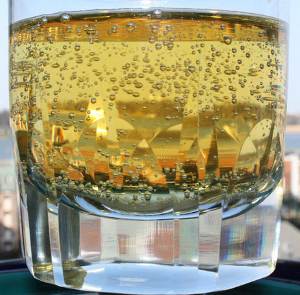What is a Precipitate?
In chemistry, a precipitate is an insoluble solid that emerges from a liquid solution. The emergence of the insoluble solid from solution is called precipitation. Often the precipitate emerges as a suspension.
Precipitates can form when two soluble salts react in solution to form one or more insoluble products.
soluble salt 1 + soluble salt 2 → insoluble salt (precipitate)


Apple juice is improved by removal of undesirable substances as a precipitate. Let's hope there's no strychnine in it!
Precipitates can also form when the temperature of a solution is lowered. Lower temperatures reduce the solubility of salts, which may result in their precipitation as solids.
Precipitation
In general, precipitation happens when one phase is ejected from another - a liquid ejects a solid, or a gas ejects a liquid or solid.
In weather forecasts, you'll hear presenters talk about precipitation, which can mean water vapor in the air is ejected as a liquid (rain) or solid (snow, hailstones, etc.) from the air.
Example 1
A Common Precipitation
If you've ever made wine, beer, or fruit juices, one of the stages you'll often go through is fining, which removes dissolved substances that would otherwise worsen the taste of the drinks.
A fining agent binds to soluble substances such as proteins, polyphenols and sulfides, causing them to form a precipitate that drops to the bottom of the liquid for easy removal.
Fining agents include egg whites and bentonite.



